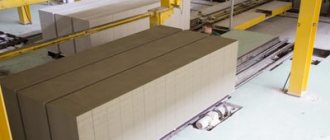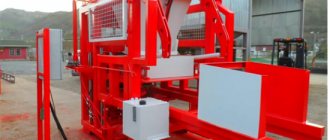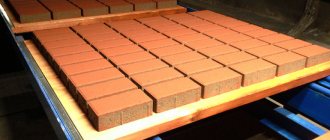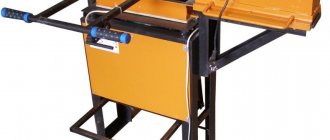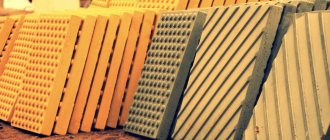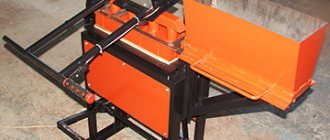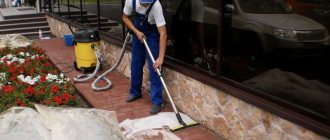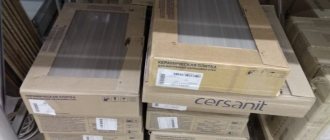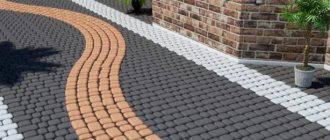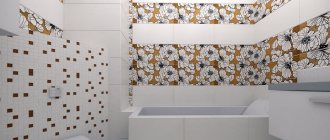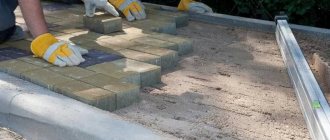Paving slabs have long established themselves as a universal road surface. Now it is simply impossible to imagine its absence in the areas adjacent to shopping centers, offices, hotels, hospitals and private properties.
Various materials are used to cover both large areas and small garden paths. Previously, the most common of them was stone. Nowadays, the variety of types includes a wide range of coatings, including rubber and wood. Such variations of individual design solutions are rare; vibropressed paving stones firmly hold the leading position in this segment.
Industrial production of paving stones in factories
Large enterprises produce paving stones of three types.
Stone, aka granite
The production of such tiles involves mechanical processing of the material. That is, the products are made using special sawing machines. According to the technology of the mixture, no modifying components are used, which guarantees the environmental purity of the product.
Granite paving stones produced in factories are usually square or rectangular in shape. The edges of such tiles are processed, making them even and smooth. On a much smaller scale, chipped paving stones are produced. Its elements are not aligned along the edges or sanded, which gives the product the most natural look. Such tiles are often used to decorate not only road surfaces, but also walls.
Clinker paving stones
This tile, like ordinary clinker, is in many ways similar to brick. Its distinctive property is increased strength, which is achieved by using special types of clay and special firing techniques. The emphasis in the manufacture of clinker paving stones is not on compacting the material. The key point in production is the firing technique.
At the first stage of the manufacturing process, crushed raw materials are turned into a solution and squeezed into molds through an extruder. The next step is to move the filled forms into special chambers in which the prepared mass is evenly heated on all sides. Finally, the products that have undergone primary heat treatment are sent to kilns for firing. Thanks to high temperatures (up to 1200°C), clinker paving stones become very durable.
Concrete paving stones
This type of coating is made from concrete. The features of the technology used for the manufacture of such paving stones will be described in detail below. Since the method of making products from this category is the most common, not only in large enterprises.
Making a countertop
This element of the press must be made with great strength because it will experience heavy loads.
- The dimensions of the table must match the tabletop.
- The frame is made from channel No. 10 or a corner 7cm by 7cm.
- The blanks are cut, trimmed and welded.
- When welding parts, it is necessary to ensure their evenness - during the welding process, metal structures can bend.
Then a rectangle is cut out of a 10 mm thick steel sheet, then placed on the prepared frame and welded. The top of the tabletop is a sheet.
Equipment for the production of paving stones
The presence of specialized equipment at an enterprise (large or small) is determined by the production technology of the products. Each type of activity has its own individual list of equipment, mechanisms and auxiliary tools. Whatever technique is used in the production of paving stones, detailed equipment of the workshop will definitely be required.
List of main equipment:
- Vibropress
. In a large enterprise, there are usually several of them. Since one can produce only a certain amount of products per unit of time. Using a vibropress, the main stage is performed - compaction of the mixture. - Vibrating table
. This specialized metal table is used for vibration casting. This device is equipped with an electric motor. Forms with a solution are placed on it, from which excess moisture and air are removed by vibration. Tables differ in the power of electric motors and the size of the working surface. - Concrete mixer.
In production, even small ones, there are usually several concrete mixers. They are used to prepare the mixture for upcoming processing. In the process of producing paving slabs, forced-action and gravity concrete mixers are used. In addition to their modes of operation, they differ in volume. - Vibrating sieve.
It is very important at the preliminary stage of production to ensure the proper quality of raw materials for the solution. Using this apparatus, sifting of bulk materials included in the mixture is carried out. - Palletizer.
It is difficult to underestimate the role of such a loader, especially in a large enterprise where automation predominates. Since all stages of the process must be performed at a set speed. Palletizers are used to move pallets with finished paving stones. This significantly saves time and makes work easier. - Drying chamber.
The equipment is used for drying tiles at the appropriate stage of their production. In factories, special rooms are allocated for such furnaces.
For convenience, it is better to separate the types of forms into a separate list:
- Steel forms
. Used in large enterprises. The use of steel molds in mini-factories is not practiced. - Silicone
. They have proven themselves to be excellent for ease of use, accessibility and durability. - Polyurethane
. With their help, paving stones with a relief surface are made. They are distinguished by their convenience (the material is easily removed) and durability. - Plastic forms
. They stand out for their low cost and variety of possible sets of forms. Not as durable as those listed earlier.
Making a table
The machine table is a metal frame with welded legs. Dimensions are selected in accordance with the expected power of the structure.
Approximate dimensions:
- 50 by 70 centimeters or 70 by 100 centimeters.
- The height of the legs of the mechanism must correspond to the height of the person who will work on it.
- To make the legs, you can use a steel angle 10 centimeters wide, a ten-centimeter pipe or a tenth channel.
- The load on the legs will be large, so they need to be reinforced with gussets (steel rectangles welded to the leg and frame).
If the machine does not change its location, it is recommended to fill the legs with concrete.
Production of concrete paving stones by vibrocompression
Vibrocompression and vibration casting are the main methods used in factories for the production of paving stones. The first method is considered the main one and is used much more often, since it has significant advantages:
- products made by vibration pressing are durable and frost-resistant;
- the most attractive aspect is the low cost of production;
- when using this method, you can automate the process as much as possible, which will significantly facilitate work and increase productivity;
- as well as produce two-layer tiles of various colors and shades.
The vibration pressing process is carried out in several stages:
- Preparation of concrete
. If you need to make a single-layer tile, one concrete mixer will be enough. Accordingly, if it’s two-layer, then two. The proportions of the substances included in the mixture are selected individually. - Molding
. At this (main) stage the material is compacted. This process takes little time. Next, the already molded paving stones are sent to pallets. The palletizer picks them up and moves them. The following ones are immediately installed in the vacant place. - Drying
. The last stage of paving stone production. In factories it is carried out in special rooms, where products are subjected to heat treatment. Sometimes the tiles are dried directly in the production premises. With this option, Portland cement is included in the solution. Pavers can be removed from pallets and sent to the packing house 6 to 8 hours after this processing step is completed.
Vibrocompression is separately divided into two subtypes:
- semi-dry vibration pressing;
- semi-dry hyperpressing.
In the first option, crushed stone is first added to the semi-dry mixture. The filled forms are then placed on a vibrating bed, where the solution is exposed to a punch. Paving stones made using this method are sometimes difficult to distinguish from real stone.
When hyperpressing technology is used, the mixture is compacted under pressure, and not due to vibration. To produce tiles in this way, a hydraulic press is used.
Thanks to its rough surface, vibropressed paving slabs have proven themselves to be excellent road surfaces. The advantages of such paving stones cannot but be appreciated in winter. Products made by vibration pressing are economical and durable. Due to the specific features of the structure, such tiles are little susceptible to the destructive effects of water and open sunlight.
Components for brick making press
To create a brick making machine, you need to imagine how it works (you can see the operation of a factory machine), the principle is the same.
Main components of the machine:
- Plate;
- Tabletop;
- Press;
- Vibromechanism.
Before starting production, it is important to make drawings of the parts. You can find several options for the machine on the Internet. You should choose based on the availability of components.
There are options for simpler brick presses, and there are more complex and powerful ones. To calculate the size of the machine, you need to decide on the size of the tile and the number of matrices. There is no point in creating a device for one form.
Business plan for the production of paving stones. Prospects
Relevance of the activity
The construction industry has always been and remains a promising and very profitable activity, and in certain cases also low-cost. It is much easier to break through and establish yourself in this niche than in the same food industry. To organize production, no sanitary licenses or lengthy searches for appropriate premises will be required.
And if large industrial plants are involved in urban development, then small enterprises are used to meet the needs of individuals. Therefore, an approximate business plan for the production of paving stones for small and medium-sized businesses will be quite relevant.
Concept development
The popularity of paving slabs as a road surface explains the presence of a large number of manufacturers on the market. In some regions this niche is almost completely filled. Therefore, before you start organizing the production of paving stones, you need to analyze the market volume and the activities of competing companies.
The first step is to take the following actions:
- Find out what volumes of products are produced by competitors. At what price and in what quantity do they sell it? Do they practice the provision of facilitating services?
- Make a list of potential buyers. They may be construction crews, owners of objects under construction, or private individuals.
- Select suppliers of raw materials with the most favorable terms of cooperation.
- Calculate approximately the profitability of future activities and its payback.
Financial investments
The cost calculation given below will be relevant for a small enterprise located in rented premises with a small number of employees.
Approximate start-up costs when starting a business from scratch:
- Preparing the premises. To operate a mini-factory for the production of paving stones, it is necessary to use an area of 100 m². The costs for this item will be 30 thousand rubles.
- Purchase and installation of equipment – 600 thousand rubles.
- Registration and certification of activities – 20 thousand rubles.
Total – 650 thousand rubles.
Regular monthly expenses:
- Lease payments – 30 thousand rubles.
- Salary (based on 3 employees) – 60 thousand rubles.
- Taxes and utility bills – 25 thousand rubles.
- Advertising and product promotion – 5 thousand rubles.
Total – 120 thousand rubles.
Profitability of production
To make 1 m² of paving slabs you will need:
- cement – 100 rub.
- granite-sand mixture – 50 rub.
- dyes and plasticizer – 40 rub.
The total cost is 190 rubles.
Considering an eight-hour working day with two days off, 500 m² of paving stones can be produced per day. Its cost is about 700 rubles/m².
Assuming that sales are 100%, revenue will be 350,000 rubles. The cost and monthly expenses are subtracted from the total profit: 350,000 - (190 rubles x 500 m²) - 120,000 = 135,000 - net profit.
The payback period is approximately 5 – 6 months.
Purchase of raw materials
As in any other type of activity, in the production of paving stones, special attention should be paid to the quality of the purchased raw materials. The required components are few, they are identical to those used in factories: cement, sand, granite, water, plasticizers, dyes.
However, only an individual (branded) recipe guarantees constant demand and good income. Therefore, no company will ever make public the exact composition of the solution used in production. To find your own exclusive recipe, you will have to experiment or seek help from a professional specialist.
It is very important at the initial stage to select bona fide suppliers of raw materials. The success of the entire production depends on this. It is better to immediately establish long-term cooperation with them in order to receive discounts and the possibility of flexible payment over time.
Features of paving stone manufacturing technology
The production of paving slabs in small enterprises is practically no different from factory methods. The only differences are the scale of activity and the speed of production. Thanks to automation in factories, the process happens much faster.
Paving slabs are made in stages:
- First of all, mix the solution;
- then pour it into molds;
- subjected to compaction on a vibrating table;
- then stand for at least a day;
- heat the filled forms in water;
- remove formwork;
- Finally, the finished product is sent for storage.
Workshop equipment
A business plan for the production of paving slabs from scratch takes into account the costs of purchasing specialized equipment. And even though the planned business will be very small (home production), this expense item should be taken into account first.
The standard set of equipment required for the production of paving stones includes:
- scales;
- concrete mixer;
- vibration machine;
- forms;
- heated baths;
- sieve;
- carts.
This list is somewhat different from what is current at large enterprises, which is quite justified by the production scale.
Product delivery
This point should be thought about in advance when organizing activities. If you have your own truck and forklift, you can do this yourself. But not everyone has such opportunities at the starting stage. Since renting equipment is a very expensive undertaking, at first you can offer customers pickup. Although this nuance will, to a certain extent, help reduce demand.
Market promotion
Paving stones are in high demand on the market, as noted above, but it will not be easy for a novice entrepreneur to attract buyers and develop his client base.
The best option would be to organize wholesale sales of goods. The following may be interested in purchasing paving slabs: construction warehouses and shops, organizations and individuals who own property with adjacent territory. When forming a client base, first of all, attention should be paid to them.
When organizing the production of paving stones, the business plan will also include marketing costs. Without advertising, customers will not learn about the benefits and benefits of the product that the seller is ready to offer them. To express yourself and present your product you need:
- create your own website with a visual demonstration of products;
- place an ad on the Internet;
- prepare leaflets and booklets for distribution.
And don’t forget that the best advertising is customer reviews.
Frame making
Prepared blanks for the frame are welded using electric welding. Weld seams are cleaned using an angle grinder, then the entire workpiece is painted. It is advisable to paint in order to prevent rust: the cement-sand mixture is diluted with water.
The frame must have no in-plane displacements.
Product sales and advertising
There are three main areas where products can be supplied:
- Contracting companies. Such companies act as intermediaries between the government and suppliers. They receive orders for work to improve urban areas from local authorities. Then they purchase the necessary materials, hire employees and fulfill the agreed obligations. It should be taken into account that in large cities the volume of orders from contracting firms can provide enormous income.
- Large construction companies. For the construction of residential complexes, business centers and other structures, paving stones are also needed. It gives a beautiful appearance and practicality. Of course, purchases occur in smaller volumes than from contractors, but clearly more than in retail sales.
- Retail. This is the sale of products through construction stores directly to an ordinary buyer. Such a sales market can bring good profits if you establish cooperation with local chain stores of construction stores and provide them with regular shipments of paving stones.
The best advertisement is the quality of the product. But if we talk about marketing, then you need to choose advertising that will be aimed at your target audience. If you sell goods through retail chains, you can use outdoor advertising. To get into cooperation with contractors or construction companies, you need to regularly monitor advertisements and make yourself known in the city where the production is located. One of the promising areas will be the development of your brand.
Electric motor for brick making machine
For the operation of a homemade concrete block press, an electric motor is required. The engine should be selected more powerful. It is recommended to use VI99/E. You can use any electric motor by connecting it with a belt to an eccentric.
Depending on the type, the engine is mounted below on a table top or on a work table. The electric motor is secured with bolts. To prevent the nuts from loosening due to vibration, engraving washers are used.
How to make molds for paving slabs
Typically, tile molds are made from polyurethane or silicone. Factory machines come with a certain set of ready-made shapes. However, they can be purchased separately, although such a purchase will be quite expensive.
Those who prefer to do everything with their own hands can easily make the molds themselves. For this you will need:
- polyurethane;
- hardener;
- sample tile;
- gypsum.
DIY plastic mold for paving slabs
Gypsum may be needed if standard tile shapes are not suitable and you want to make your own tile configuration.
So, take a ready-made sample tile or your own gypsum blank and fill it with liquid polyurethane mixed with a hardener. After complete drying, the finished form can be easily removed from the sample.
